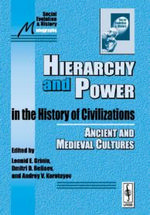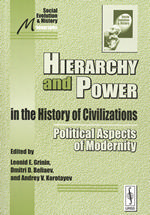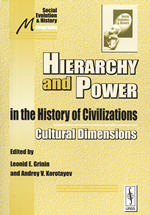Hierarchy and Power in the History of Civilizations
The human history has evidenced various systems of hierarchy and power in different spheres of social life. The relations of hierarchy and power are relevant for every sphere as they penetrate the whole life of a society and represent a sort of framework for an individual's activity.
-

Hierarchy and Power in the History of Civilizations:
Ancient and Medieval CulturesThe relations of hierarchy and power penetrate the whole of social life but naturally they are most visible in the political sphere. In this volume the relations of hierarchy and power are studied with respect to representative samples of pre-modern states and societies. These interesting and revealing cases cover a wide range both in time and space, as well as different types of the relations of hierar-chy and power in the history of ancient and medieval civilizations.
-

Hierarchy and Power in the History of Civilizations:
Political Aspects of ModernityThe relations of power and hierarchy in the modern political world system demonstrate a great number of variants, levels and dimensions. In the present edited volume the focus lies on three aspects of this important subject. These are revolutionary transformations (in the broad sense of this notion), violence, and globalization. Each volume section is devoted to one of those themes.
-

Hierarchy and Power in the History of Civilizations:
Cultural DimensionsThe relations of hierarchy and power are relevant for every sphere.The cultural sphere is not an exception, although, of course, it has great peculiarities in the manifestation of power-hierarchical relations. The relations here are usually informal and more often connected with traditions than with norms, there are much less power structures that have the legal right for coercion.





